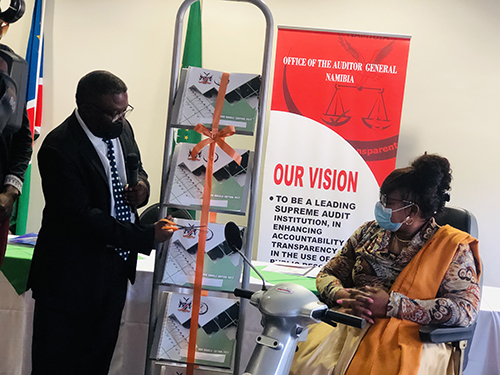Wilhelmina Iimene
The office of the auditor general has launched a publication of their first-ever braille information booklet. The booklet is aimed at including the visually impaired community through simplifying audit information, while at the same time improving the relevance of the office of the auditor general to its stakeholders.
According to the current Affirmative Action Plan, the office should employ at least 5% of the total staff with disability. “Our office achieved a 3.27% with over two-thirds implementation of the legal requirement,” auditor general Junias Kandjeke said at the launch.
The braille booklet promotes full inclusivity of visually impaired people.
It contains the basic purpose of the audit report as well as the well-explained process of auditing.
Speaking at the launch, deputy minister of disability affairs Alexia Manombe-Ncube said: “Various career opportunities in the office of the auditor general are included, since we have persons with disabilities who have studied in these fields”.
She added this is in hope for the office of the auditor general to open its doors to welcome graduates with disabilities.
“The more people with disabilities are on the employment list of various institutions, ministries and agencies, the higher our status as a truly inclusive nation that leaves no one behind,” she said.
The booklet, themed: ‘Proving access and opportunity for people with disabilities, will bring hope for a better tomorrow and bring along new possibilities for people with visual impairment regarding participation in discussions, employment and career opportunities.
The booklet makes it easy for visually impaired people to study the information themselves and make informed decisions.
Manombe-Ncube further noted the booklet will allow for access to information that was previously broadcast for a short period on radio or TV.
“Information on the radio and TV are very selective, since, mostly, only the highlights are shared, but the brailed copy allows the readers to return to the copy as many times as they wish and to make thorough decisions,” she said.
She called on other institutions, companies, ministries and agencies to come on board to create opportunities for persons with disabilities, and to spearhead initiatives that will raise their standard of living.
Kandjeke also added his office might not be the first government institution to print their information booklet into braille, but they take pride in joining those who have come before them in the inclusive process.
“Converting our basic audit information into Braille and providing access of our audit information to the visually impaired community is the first step toward sharing our audit work with diverse audiences,” he said.


